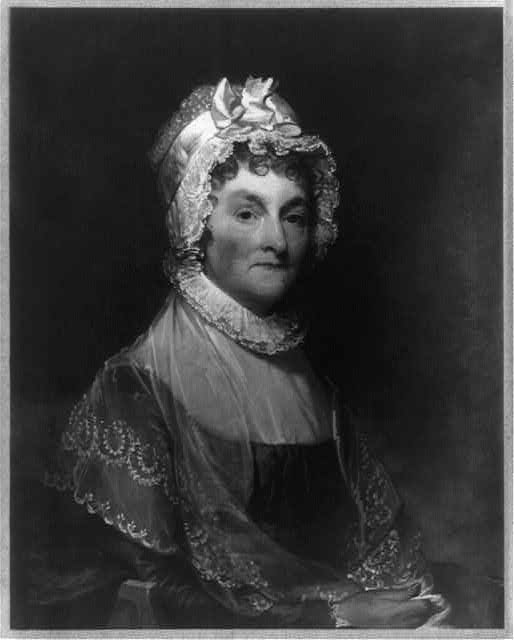Too often in society women are belittled because of their gender, despite their numerous abilities and achievements. Women all over the world fall victims, and struggle to become survivors, of inequality against their male counterparts. Although some improvements have been made over time, there is still much progress to be done in order to establish an equality between men and women in all aspects of life, not just in a few token areas. During the eighteenth century, a few women became advocates for women’s rights and fought for individual freedoms that were attainable for men but rarely for women. One of these advocates was Abigail Adams, first lady to the second President, John Adams. Abigail, a devout wife and American citizen, was more than just a first lady to the president. She was an early feminist voice who refused to stand by and allow women to be suppressed of their capabilities and their rights.
In order to comprehend why Abigail felt so strongly and fought so vigorously for her beliefs, it is important first to understand how her beliefs became rooted. Abigail was the second out of four children from William Smith and Elizabeth Quincy. Her father was a minister of North Parish Congregational Church of Weymouth in Massachusetts colony; her mother Elizabeth was a typical housewife and mother. Abigail was fortunate enough to be born into such an eminent family in New England with a prosperous lineage of statesman, ministers, and merchants. She was raised in a household that wholeheartedly affirmed the beliefs of rational Puritanism, a solid Christian faith, and a strong education.1

From an early age, Abigail was introduced to the limitations of women by being unable to attend school. Growing up in the eighteenth century, education was highly sought after; however, education was primarily for boys, not girls. Boys had the opportunity to study various subjects, such as Latin, math, French, literature, and Greek. Elite families often prepared their boys to receive a higher education, either at Harvard College or abroad. Since girls were not permitted to attend school, Abigail was educated at home. Though her education did include some rudimentary training in academic areas such as reading and writing, most of her education focused on becoming a traditional housewife and mother. She observed her mother in common domestic skills such as sewing, cooking, and home maintenance.2
Her most significant influence occurred around the time of the Revolutionary War, which was a time of extreme stress and chaos for the young republic. This was a time when participation of every American became absolutely imperative in order to win not only the war, but also to restructure the country afterwards. Despite the circumstances, the social conditions for women went largely unchanged. During the Revolutionary War, while many of the men were away serving the war effort, the women were left in charge of the businesses and farms. The towns and cities were left with impoverished women who were often driven to lead protests and riots against price increases, as well as resorting to looting for food. In other parts of the country, women began to fight back against British troops, whom they were forced to quarter during the war. Some women either by choice, force, or desperation, traveled to the Patriot army camps to live with their male relatives.3
After the women began migrating to the camps, many men became hostile and voiced brutal complaints against the women. One man even expressed a barbarous comment about women, claiming “their falling, their brows beady with the heat, their belongings, slung over one shoulder, chattering and yelling in sluttish shrills as they went.”4 George Washington himself even believed the females to be disruptive and a distraction to the troops. In reality, women were actually a great asset and made major contributions towards the war effort. Most women performed domestic duties such as cooking, laundry, nursing, and even boosting the morale of the soldiers. Some women went beyond the normal expectations and became involved in the combat.5
By the end of the war, the views and standards of women had remained the same as at the outset. Many women began to question their place in society, including Abigail Adams. As early as March 31, 1776, while her husband was in Philadelphia forming a new government, Abigail wrote a letter to her husband, John, imploring him to expand women’s rights to become equal with the rights of men:
I long to hear that you have declared an independancy—and by the way in the new Code of Laws which I suppose it will be necessary for you to make I desire you would Remember the Ladies, and be more generous and favourable to them than your ancestors. Do not put such unlimited power into the hands of the Husbands. Remember all Men would be tyrants if they could. If perticuliar care and attention is not paid to the Laidies we are determined to foment a Rebelion, and will not hold ourselves bound by any Laws in which we have no voice, or Representation.6
Abigail was making her purpose clear and made sure it was known that women would no longer stand for unfair and unjust treatment.

Abigail continued to fight for the rights of women for the rest of her life. Although she was most known for her strong tone in her letters, she was also a major advocate for the right of education for women. Abigail became one of the most literate and politically-powerful women of her time.7 Her ideals, courage to voice her intellectual opinions, and ability to stand up for her beliefs is what established the main attraction between her and John. Abigail was able to maintain the perfect image of the domestic housewife, mother, and First Lady to the President of the United States. Abigail tread a path for women which is still being followed today. Hopefully her beliefs and visions for the equality of women will one day come true.
- Salem Press Biographical Encyclopedia, 2016, s.v. “Abigail Adams” by Mary E. Virginia. ↵
- Salem Press Biographical Encyclopedia, 2016, s.v. “Abigail Adams” by Mary E. Virginia. ↵
- Alan Brinkley, American History: Connecting with the Past Volume 1, 15 edition (New York: McGraw-Hill Education, 2015), 147. ↵
- Brinkley, American History: Connecting with the Past, 147. ↵
- Brinkley, American History: Connecting with the Past, 147. ↵
- Abigail Adams, “Abigail Adams’ Letters to John Adams March 31, 1776,” Adams Family Papers: An Electronic Archive. Massachusetts Historical Society. http://www.masshist.org/digitaladams/. ↵
- Salem Press Biographical Encyclopedia, 2016, s.v. “Abigail Adams” by Mary E. Virginia. ↵



85 comments
Sofia Andrade
In my previous history classes I had learned about Abigail Adam’s influence in writing the letter “Remember the Ladies”. Before reading this article I knew that Abigail Adams was an advocate for women. Prior to this article I did not know much of what made her be such a strong advocate for women. It was interesting to learn about events that made her want to advocate for women. Being the wife of the President made her have more of a significant impact as a woman advocate.
Kathyleen Lauriano
This article did great in describing Abigail Adams. The fact that she was able to keep up the perfect housewife image and speaking her thoughts shows how she really did want change. Us women shouldn’t be undermined by men. We can do what they can do. Today men still think women should just stay home and take care of children and clean, but no. We have many higher up women in politics proving to men we are just the same.
Luisa Ortiz
This writer did a great job describing Abigail’s life, from her childhood to her powerful letters! There is so much about woman’s advocators and writers that are not represented or known in textbooks (and we should know about them!) Reading this article and the piece of the letter “Remember the Ladies” reminded me the importance of education, family values, and importance of advocating. Abigail had already a status and she could potentially keep quiet and lived comfortably instead she decided to be a voice and make an echo.
Saira Castellanos
I did not know about the Adams, i thought this was going to be about Abigail, from the Salem Witch Trials. I am so amazed at how intelligent she was. In those times i am sure that finding someone like Abigail was extremely rare. Women were so deprived of knowledge and its so sad to see that at one pont in time all men expected women to stay at home and cook and clean. I am happy that now women can work hard to achieve their goals.
Monica Avila
I’ve always read of the Adams couple and Abigail’s influence on her husband and it always astounded me. That in a time where women were viewed as the weaker sex, John Adams took his wife’s opinion and values into consideration. It is unbelievable to know just how educated she was in a time where it was rare for women to have any ‘real knowledge’. This article did a great job at explaining in detail jut how amazing Abigail Adams was.
Noah Laing
I read a book in high school about the Adams couple and how great of a significance they had, which allowed me to make several connections with this article. John Adams being the Second President of the United States allowed his wife, Abigail Adams, to have the platform to express her voice for all women. Due to the immense power between this couple, I’ve always seen them as one of the most significant married duo’s in history. Her fight for equality for women was and still is an inspiration too many people to this day, great article.
Carlos Vazquez
I read a book about John Adam’s time as president, and it amazed me to learn that Abigail was perhaps the most crucial person during the presidency. Most of her letters to her husband during that time, directly affected how John made decisions about policy. This article did a good job at showing how incredible it was for her to advocate for women’s rights in a time when that was frowned upon.
Samman Tyata
Great article! I really liked the way how you have shaped your article. It was sad to read that she was not allowed to receive an education at an early age because she was a female. However, it is really inspiring that she was a female influence during the revolutionary war. It was interesting to know that most of her education focused on becoming a traditional housewife and mother. To sum it up, it was a good read.
Edward Cerna
This was a great article and I’m glad I found it. I have heard of Abigail Adams before but only as John Adams wife, not a strong voice for feminist. I find it admirable that even though Abigail was fighting for women’s rights because it takes bravery and guts to do that back then, especially since men basically ruled everything during that time.
Hayden Hollinger
This was a very interesting, powerful article. I thought this was a very well written article that provided an in depth look at the female influences during the revolutionary war. I have so much for respect for Abigail Adams who stood up for what she believed in and women’s rights. During times like these it must have been so tough to stand up against the men in power, which makes this story even more special.